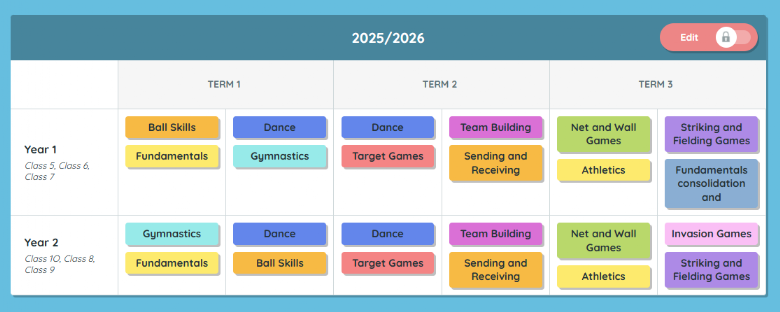Curriculum map

PE in KS1:
By the end of key stage 1, pupils are expected to know, apply and understand the matters, skills and processes specified in the relevant programme of study. Pupils should develop fundamental movement skills, become increasingly competent and confident and access a broad range of opportunities to extend their agility, balance and coordination, individually and with others. They should be able to engage in competitive (both against self and against others) and co-operative physical activities, in a range of increasingly challenging situations.
In key stage 1 pupils should be taught to:
- master basic movements including running, jumping, throwing and catching, as well as developing balance, agility and co-ordination, and begin to apply these in a range of activities
- participate in team games, developing simple tactics for attacking and defending
- perform dances using simple movement patterns.
"It is useful to look at knowledge in PE through the lens of declarative (knowing what) and procedural (knowing how) knowledge....Declarative knowledge in PE is the factual knowledge concerning movement, rules, tactics, strategies, health and participation...Procedural knowledge can be viewed as the know-how to apply declarative facts."
Research Review Series: PE, Ofsted, 2022
Through multiple units of the Get Set 4 PE scheme, we create opportunities for children to transfer and build on their declarative knowledge, procedural knowledge and physical skills set within the National Curriculum. By applying learning in different environments, children are using this embedded knowledge not just responding with recall.
To support our pupils to know more and do more, we have carefully considered how we have sequenced each of the units. Some key points to note around this are:
- We teach ball skills and fundamentals units at the start of the year to give pupils opportunities to develop the skills in isolation, build knowledge and develop relative fluency.
- This enables pupils to apply these skills in more complex games activities (such as target, net and wall, striking and fielding and invasion) where there is increased pressure, rules and decision making.
- We have placed our games units together where there are transferable opportunities for pupils to develop their understanding of the principles of attacking and defending.
- Of all our games units, target games are the easiest. We teach these first as they are a great introduction to applying simple tactics without the requirement of advanced skills.
- We have placed gymnastics alongside dance, as in gymnastics pupils are taught movement skills and actions which they could then choose to use in a more creative environment where they work independently to select actions.
- Whilst the National Curriculum states that children do not need to be taught outdoor and adventurous activity(OAA) until key stage 2, we help prepare children for this by teaching team building units in KS1.




